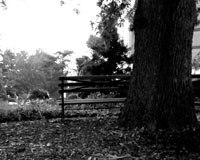
Laundry
My Blue Peninsula
Migratory
Anniversary
Of Fear
Equator
Even in her dreams, the piles of laundry grew,
ballooning first like yeast, then clouds,
then like a blizzard bursting forth from every room
and down the hall, chasing her, she said.
With squat fingers caught too tight
beneath her wedding ring she snapped
from taut laundry lines, the diapers of her youngest
two. Lengthwise in thirds, she folded them,
then again in half, making tidy geometries of what
all night tornadoed through her brain. Did she gaze
at the agitator in the core of the machine and recognize
the violence of the small repeated motions?
How clean everything afterward would be, stripped
of grime, of yesterday’s ambitions, sterile.
Before the volcanologist vanished,
I stood at the window
and watched a hawk
made of every syllable in the dark
whispering ‘go, go, go.’
‘Don’t go,’ said the volcanologist.
I walked the wrack line all night.
Eel grass, sargassum, and sand dollars—
left by the sea as it receded.
Not so different from gifts the pilgrims leave
at the gravesite of Emily Dickinson—
pine cones, scallop shells, and lavender.
Wrack means ruin and remnant and wreckage.
‘Guess,’ I said to the volcanologist, ‘which
were left by the ocean and which by devotion
to Emily Dickinson:
an acorn, a Barbie doll, a shark tooth, a lighter.’
He would not guess.
Wrack means what has been left behind.
A thimble, sundry pencils, a tin of Grizzly dip.
He would not guess.
Wrack means to forcefully break or to smash.
A fast food receipt, a tennis ball, a dead sea lion.
He would not guess.
Pennies and feathers, flip flops and fishing line,
three-spined stickleback and a plastic pig.
He would not venture a single guess.
Wrack means to wreck completely.
One-way lava and two-way tides.
Stones and the bones of a grebe.
Candle and shovel. We judge each from our Geography
if it will be lonelier, Without the Loneliness.
But, fuel can and tiger lily, I simply cannot guess.
Note: The title of this poem and lines in the final stanza borrow from the following poems by Emily Dickinson: ‘It might be lonelier’ (Johnson #405, Franklin #535) and ‘Volcanoes be in Sicily’ (Johnson #1705, Franklin #1691A).
Answers:
Found along the wrack line: a Barbie doll, a shark tooth, a lighter, a tin of Grizzly dip, a tennis ball, a dead sea lion, feathers (both), flip flops, fishing line, three-spined stickleback, stones (both), the bones of a grebe, a shovel, a fuel can
Left at Emily Dickinson’s gravesite: an acorn, a thimble, pencils, a fast-food receipt, pennies, feathers (both), a plastic pig, stones (both), a candle, a single tiger lily
A hundred years or so ago,
when sparrows disappeared
each winter, people believed
they’d gone to roost
on the moon.
This is what
I tell my children when
they ask me where
you’ve gone—
you, who today
have forgotten my eldest’s
name, but who might
remember tomorrow.
There was a prohibited scissor cut
and a forbidden use of cellophane tape
in the origami deer
but, so what?
This wasn’t a competition,
but an anniversary—which is,
I suppose, a competition
against time.
‘Thank you,’ I said, and
I placed the origami deer
on the window sill, in the sun,
facing south.
Of falling, of loud noises—
the two fears we’re born bearing.
The rest we learn as we go.
In the desert the fear
of being
an oar in the desert.
At sea the fear
the night sky might stop
diagramming sentences of stars.
At night the fear
the crow with one white wing
has flown.
In winter
the fear
that green can’t cry.
In times of change the fear
in any direction there may not be
two adjacent strangenesses.
In times of no change
fear of the bruised beauty
of the blue legato.
In time of youth
fear of the ephemeral
geometry of the jungle.
In old age fear the different
sizes of eternity—the countable and the uncountable—
might not be different after all.
In shame
fear of the ocean’s
irreversibility.
In times of powerlessness
fear of the eyelid’s infinite
perimeter.
In catastrophe
fear there may never be another
apostrophe.
In times of no fear
fear
of fear of fear of
A breadthless length Euclid defined
as a line, but I heard breathless length.
No, I thought, the equator is Earth’s blue
lasso, a human line for hanging
numbers on a spinning planet, an image
existing only because we (and our breaths) do.
Is being forgotten by a parent good
practice for being forgotten by a planet?
A fossil is fashioned by an exact amount
of pressure and mud. This honeysuckle,
all Sunday’d up, will it persist in the sediments
of Earth or in the memory of my father?
A line, perhaps, is a breathless length,
and the equator’s the Earth’s blue noose,
existing because we (and our breaths) do.
But when we are gone, it will unravel, loosen,
and the Earth will let out a sigh. Maybe it wasn’t
our breath that Euclid never meant anyway.
Jessica Goodfellow’s poetry books are Whiteout (University of Alaska Press, 2017), Mendeleev’s Mandala (2015), and The Insomniac’s Weather Report (2014). A former writer-in-residence at Denali National Park and Preserve, she’s had poems in The Southern Review, Scientific American, Ploughshares, Verse Daily, Motionpoems, and Best American Poetry 2018.

